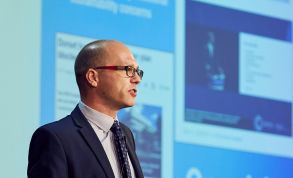Convergence 2.0: Simplicity and relationships key to ICS success
In a special panel session, three ICSs briefed delegates on their journeys towards system working. All three systems – Frimley Health and Care, Berkshire West and Dorset – have built on a recent history of collaboration, arguably giving them a head start on other sustainability and transformation partnerships. There are clear differences in the approaches being taken, but there was also agreement about some key ingredients for success.
‘The time you spend with your colleagues in the system and building those relationships – the time our board has spent away from thinking about the formal agenda and in that development phase – that is time well spent,’ said Nigel Foster, finance director of Frimley Health NHS Foundation Trust and of Berkshire East Clinical Commissioning Group. ‘I’d do more of this.’
Mr Foster (pictured below, left) added that, with health outcomes so dependent on the built environment, public health and socio-economic factors, relationships with local government were particularly important.
Rebecca Clegg (pictured below, centre), acting chief finance officer of Berkshire West CCG and part of the Berkshire West ICS, said that keeping the patient at the centre of all decisions was obvious, but necessary. ‘You need to think through how we can support this in our individual organisations and as a system. There are the classic business cases that don’t get through because they don’t work in a payment by results [PBR] environment,’ she said. ‘Putting the patient at the centre and then finding a way of making it work is really important.’
Mark Orchard (pictured above), finance director of Poole Hospital NHS Foundation Trust – part of the Dorset ICS – urged delegates to keep things simple. Dorset has in effect replaced the tariff system locally with block arrangements. Flat cash settlements for providers in 2017/18 followed by a 1% increase for 2018/19 were agreed based on flat activity. And a series of offsets have been agreed for the current year within the system so that all providers face the same cost improvement challenge to deliver the set overall system control total.
Mr Orchard accepted that what worked in Dorset – broadly a ‘closed’ or self-contained system – would not work in other areas. But he still urged colleagues to avoid unnecessary complexity. ‘My advice is to keep it simple,’ he said. ‘We’ve moved away from a rules-based system on the money, with risk-share based on trust in a lot of ways. It is based on [a recognition that] we are all in this together.’ 
Mr Orchard added that when the system had explored going down more of a risk management route, with provisions being made for different scenarios, it just started to look like the PBR model again. ‘The finance leadership community can play a big role in just keeping things simple,’ he said.
Related content
We are excited to bring you a fun packed Eastern Branch Conference in 2025 over three days.
This event is for those that will benefit from an overview of costing in the NHS or those new to costing and will cover why we cost and the processes.